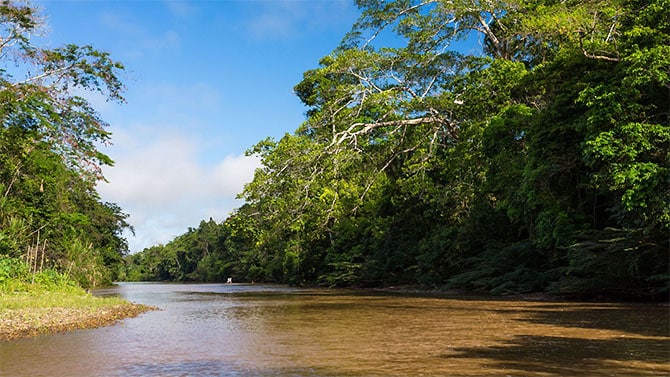Panguana Research Station and Foundation guardian of the Amazonian rainforest for over 50 years
Helping the oldest biological research station in Peru, protect and restore Amazon rainforests
Situation
Amazon + deforestation = Earth’s lungs on life support #itstime
The Amazon, which is believed to generate as much as 20% of the Earth’s oxygen, plays an essential role in maintaining the balance of carbon dioxide in our atmosphere¹. It serves as a habitat for one-tenth of all known species on Earth² and provides a livelihood for millions of people who rely directly on these forests.
The Amazon, a critical element of our planet’s life support system, stretches across a vast region of South America, including Peru. Peru ranks tenth in the world for its forested area, contributing to its status as one of the most biodiverse countries globally. The World Wildlife Fund (WWF) has identified the Amazon as one of 11 regions projected to experience more deforestation and forest degradation than any other area by 2030. In Peru, an estimated 1,100 square miles of forest are cleared annually, with around 80% of this deforestation occurring illegally³. This equates to the loss of approximately 700,000 soccer fields’ worth of rainforest due to deforestation and degradation each year.
Research indicates that a significant portion of the rainfall in the Amazon is generated by the forests themselves through a process known as transpiration, creating a self-sustaining ecosystem. However, with the escalating rates of deforestation, it is feared that the Amazon is approaching a critical tipping point. This could potentially lead to a systemic collapse of this vital ecosystem⁴. In order to conserve this unique and extraordinarily diverse ecosystem, it is imperative not only to protect existing forests but also to reverse the effects of deforestation and ensure the protection of the existing biodiversity.

Image: Panguana Foundation
Established in 1968 by German zoologists, Panguana is Peru’s oldest biological research station, nestled at the base of the El Sira mountain range to the east of the Andes. The primary objective of the Panguana project is to study, safeguard, and conserve the unique ecosystem of the Amazonian rainforest. In 2011, parts of the Panguana Biological Research Station were designated as a Privately Owned Conservation Area by the Peruvian Ministry of the Environment, marking a significant stride towards securing its future. The Panguana Foundation was set up in 2014 to ensure the enduring preservation of various projects and their implementation. Spanning nearly 1,600 hectares of protected land, predominantly covered by primary forests, Panguana is a global gem for scientific research, biodiversity documentation, and raising awareness about endangered habitats and ecosystems due to changes in climate and land use.⁵
The Panguana Foundation is deeply dedicated to its multifaceted work, which encompasses research, nature conservation, climate protection, and social engagement. It strives to instil a heightened sense of environmental and climate protection responsibility among the local indigenous youth. For many years, the Foundation has been actively supporting a variety of school and community projects related to infrastructure, living conditions, and access to medical care in several neighbouring indigenous Asháninka villages, with a particular focus on Pampas Verde and the central village of Tahuantinsuyo.
PwC Germany is firmly committed to PwC’s purpose of building trust in society and solving important problems. As part of their commitment to nature conservation and ecosystem protection, PwC Germany is collaborating with the Panguana Foundation. Their shared hope is that together they can contribute to securing a sustainable future for the Foundation.
"The ecological problems we face today, we cannot solve alone. We strongly believe in our cooperation with the Panguana Foundation and their holistic approach commiting to scientific research of the rainforest, devoted nature, biodiversity and ecosystem protection and upright social engagement. PwC Germany is pleased to support Panguana financially and in ensuring that their commitment is officially and internationally recognised. Last, but not least the history of the foundation and the personal commitment of Dr. Juliane Diller and team are proof of the art of the possible."
Experience
Assisting in the realisation of the most promising opportunities for Panguana #bethesolution
PwC Germany was introduced to the Panguana Foundation in 2018, when the founder, Juliane Diller, was awarded the Richard Merton Honorary Pin. This event facilitated an introduction between the two entities. In 2019, an official collaboration had been established, with PwC Germany offering pro bono support to the Foundation.
The task at hand involves assisting the Panguana Foundation in identifying the most effective strategies for local reforestation and ecological conservation, as well as finding a method to financially reward the Foundation's important work. Furthermore, the exploration of other sustainable land use and local food production methods, such as permaculture and aquaponics, are being considered as additional means to bolster restoration and protection efforts. Through its collaboration with the Panguana Foundation, PwC Germany acquires valuable insights into the challenges associated with safeguarding biodiversity and diverse ecosystems. In turn, Panguana is able to continue their invaluable conservation work and broaden their initiatives to restore rainforests in a manner that is both biologically diverse and sustainable.
PwC Germany strongly believes there is an urgent need to promote the unique biodiversity and related ecosystem services of the rainforest, employing an integrated and holistic approach.
"Without PwC Germany's expertise and commitment, the Panguana Foundation would have difficulties being aware of all the possibilities for promoting what we do and love - learning about and protecting the biodiversity and ecosystems at Panguana. We especially enjoy the regular exchange and the joint project development with the team that helps us move forward."
Impact
Building community engagement, creating sustained ecological preservation. #togetherwesolve
Through PwC Germany’s support the Panguana Foundation has begun to explore different possibilities to ensure its ecological preservation is strongly recognised.
There remains much to be done. PwC Germany’s strong commitment in collaboration with the Panguana Foundation, will empower the Foundation to continue their commitment to conservation, research and climate protection. Their educational mission aims to awaken a greater sense of environmental and climate protection responsibility, not only within local communities but also on an international scale.
In 2020 PwC Germany donated €40,000 to the Panguana Foundation as part of its yearly Christmas donation to help support the preservation of the endangered rainforest adjacent to the Panguana Foundation research station.
¹Why amazon rainforest is important life support is burning, Business Insider Australia website
²Amazon Facts, WorldWildLife website
³Deforestation in Peru, WorldWildLife website
⁴Boers et al. 2017: A deforestation-induced tipping point for the South American monsoon system
⁵Panguana Foundation website. About us.
⁶Verra website. Verified Carbon Standard Programme.
















